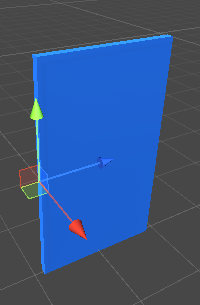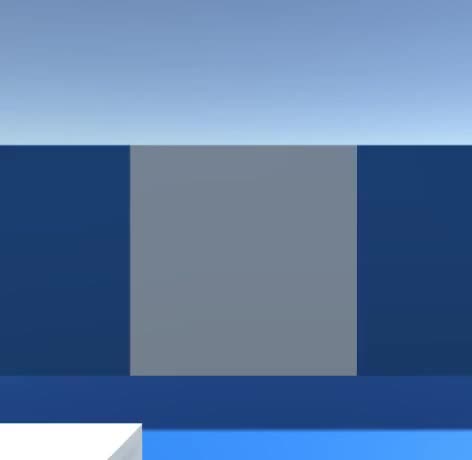Door Scripts pentru Unity
În acest tutorial, voi arăta cum să faci o ușă clasică și o ușă glisantă în Unity.
Ușa clasică
O ușă clasică este o ușă obișnuită care se deschide prin rotirea în jurul balamalelor sale.
Pași
Pentru a face o ușă obișnuită în Unity, urmați pașii de mai jos:
- Creați un script nou, numiți-l 'SC_DoorScript', eliminați totul din el, apoi lipiți codul de mai jos:
SC_DoorScript.cs
//Make an empty GameObject and call it "Door"
//Drag and drop your Door model into Scene and rename it to "Body"
//Make sure that the "Door" Object is at the side of the "Body" object (The place where a Door Hinge should be)
//Move the "Body" Object inside "Door"
//Add a Collider (preferably SphereCollider) to "Door" object and make it bigger then the "Body" model
//Assign this script to a "Door" Object (the one with a Trigger Collider)
//Make sure the main Character is tagged "Player"
//Upon walking into trigger area press "F" to open / close the door
using UnityEngine;
public class SC_DoorScript : MonoBehaviour
{
// Smoothly open a door
public AnimationCurve openSpeedCurve = new AnimationCurve(new Keyframe[] { new Keyframe(0, 1, 0, 0), new Keyframe(0.8f, 1, 0, 0), new Keyframe(1, 0, 0, 0) }); //Contols the open speed at a specific time (ex. the door opens fast at the start then slows down at the end)
public float openSpeedMultiplier = 2.0f; //Increasing this value will make the door open faster
public float doorOpenAngle = 90.0f; //Global door open speed that will multiply the openSpeedCurve
bool open = false;
bool enter = false;
float defaultRotationAngle;
float currentRotationAngle;
float openTime = 0;
void Start()
{
defaultRotationAngle = transform.localEulerAngles.y;
currentRotationAngle = transform.localEulerAngles.y;
//Set Collider as trigger
GetComponent<Collider>().isTrigger = true;
}
// Main function
void Update()
{
if (openTime < 1)
{
openTime += Time.deltaTime * openSpeedMultiplier * openSpeedCurve.Evaluate(openTime);
}
transform.localEulerAngles = new Vector3(transform.localEulerAngles.x, Mathf.LerpAngle(currentRotationAngle, defaultRotationAngle + (open ? doorOpenAngle : 0), openTime), transform.localEulerAngles.z);
if (Input.GetKeyDown(KeyCode.F) && enter)
{
open = !open;
currentRotationAngle = transform.localEulerAngles.y;
openTime = 0;
}
}
// Display a simple info message when player is inside the trigger area (This is for testing purposes only so you can remove it)
void OnGUI()
{
if (enter)
{
GUI.Label(new Rect(Screen.width / 2 - 75, Screen.height - 100, 155, 30), "Press 'F' to " + (open ? "close" : "open") + " the door");
}
}
//
// Activate the Main function when Player enter the trigger area
void OnTriggerEnter(Collider other)
{
if (other.CompareTag("Player"))
{
enter = true;
}
}
// Deactivate the Main function when Player exit the trigger area
void OnTriggerExit(Collider other)
{
if (other.CompareTag("Player"))
{
enter = false;
}
}
}- Trageți și plasați modelul ușii în vizualizarea Scenă (sau creați un nou Cub și scalați-l pentru a semăna cu o ușă)
- Creați un nou GameObject (GameObject -> Create Empty) și denumiți-l "Door"
- Mutați obiectul "Door" în poziția în care ar trebui să fie balamaua ușii

- Atașați o componentă SphereCollider la obiectul "Door" și modificați-i raza astfel încât să fie mai mare decât o ușă (aceasta va fi zona de unde jucătorul va putea deschide ușa)
- Mutați modelul ușii în interiorul obiectului "Door"
- Asigurați-vă că playerul dvs. este etichetat ca "Player"
- După ce intri în zona declanșatorului, ar trebui să poți deschide/închide ușa apăsând 'F'.
Ușă glisantă
O ușă glisantă este o ușă care se deschide prin alunecare într-o direcție specifică (de ex. în sus, în jos, la stânga sau la dreapta) și este adesea folosită în nivelele SF.
Pași
Pentru a realiza o ușă glisantă în Unity, urmați pașii de mai jos:
- Creați un nou script, numiți-l 'SC_SlidingDoor', eliminați totul din el, apoi lipiți codul de mai jos:
SC_SlidingDoor.cs
//Make an empty GameObject and call it "SlidingDoor"
//Drag and drop your Door model into Scene and rename it to "Body"
//Move the "Body" Object inside "SlidingDoor"
//Add a Collider (preferably SphereCollider) to "SlidingDoor" Object and make it bigger then the "Body" model
//Assign this script to a "SlidingDoor" Object (the one with a Trigger Collider)
//Make sure the main Character is tagged "Player"
//Upon walking into trigger area the door should Open automatically
using UnityEngine;
public class SC_SlidingDoor : MonoBehaviour
{
// Sliding door
public AnimationCurve openSpeedCurve = new AnimationCurve(new Keyframe[] { new Keyframe(0, 1, 0, 0), new Keyframe(0.8f, 1, 0, 0), new Keyframe(1, 0, 0, 0) }); //Contols the open speed at a specific time (ex. the door opens fast at the start then slows down at the end)
public enum OpenDirection { x, y, z }
public OpenDirection direction = OpenDirection.y;
public float openDistance = 3f; //How far should door slide (change direction by entering either a positive or a negative value)
public float openSpeedMultiplier = 2.0f; //Increasing this value will make the door open faster
public Transform doorBody; //Door body Transform
bool open = false;
Vector3 defaultDoorPosition;
Vector3 currentDoorPosition;
float openTime = 0;
void Start()
{
if (doorBody)
{
defaultDoorPosition = doorBody.localPosition;
}
//Set Collider as trigger
GetComponent<Collider>().isTrigger = true;
}
// Main function
void Update()
{
if (!doorBody)
return;
if (openTime < 1)
{
openTime += Time.deltaTime * openSpeedMultiplier * openSpeedCurve.Evaluate(openTime);
}
if (direction == OpenDirection.x)
{
doorBody.localPosition = new Vector3(Mathf.Lerp(currentDoorPosition.x, defaultDoorPosition.x + (open ? openDistance : 0), openTime), doorBody.localPosition.y, doorBody.localPosition.z);
}
else if (direction == OpenDirection.y)
{
doorBody.localPosition = new Vector3(doorBody.localPosition.x, Mathf.Lerp(currentDoorPosition.y, defaultDoorPosition.y + (open ? openDistance : 0), openTime), doorBody.localPosition.z);
}
else if (direction == OpenDirection.z)
{
doorBody.localPosition = new Vector3(doorBody.localPosition.x, doorBody.localPosition.y, Mathf.Lerp(currentDoorPosition.z, defaultDoorPosition.z + (open ? openDistance : 0), openTime));
}
}
// Activate the Main function when Player enter the trigger area
void OnTriggerEnter(Collider other)
{
if (other.CompareTag("Player"))
{
open = true;
currentDoorPosition = doorBody.localPosition;
openTime = 0;
}
}
// Deactivate the Main function when Player exit the trigger area
void OnTriggerExit(Collider other)
{
if (other.CompareTag("Player"))
{
open = false;
currentDoorPosition = doorBody.localPosition;
openTime = 0;
}
}
}- Trageți și plasați modelul ușii în vizualizarea Scenă (sau creați un nou Cub și scalați-l pentru a semăna cu o ușă)
- Creați un nou GameObject (GameObject -> Create Empty) și denumiți-l "SlidingDoor"
- Mutați obiectul "SlidingDoor" în poziția centrală a modelului de ușă
- Atașați o componentă SphereCollider la obiectul "SlidingDoor" și modificați-i raza astfel încât să fie mai mare decât o ușă (aceasta va fi zona care va declanșa evenimentul deschis)
- Mutați modelul ușii în interiorul obiectului "SlidingDoor"
- Asigurați-vă că playerul dvs. este etichetat ca "Player"
- La intrarea în zona de declanșare, ușa ar trebui să se deschidă automat și apoi să se închidă odată ce jucătorul părăsește zona de declanșare.
